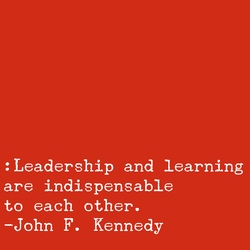
In the news some weeks ago, we read an interview with a well-known top executive from Finland. He had just visited Oslo to share his thoughts about leadership. He came through as a wise man, with many insights about leadership easy to agree with. Except one thing - he said that there was no use in reading about leadership. Actually, according to the article, he said that if you had a leader in your team and saw a book about leadership on his desk, the best you could do was to fire him/her. Well, no rules without exceptions, he himself enhanced his own leadership skills by referring to an old book about military behavior.
Well, we found this to be a peculiar story in today's business world. And if we look behind the words, what do we find?
Is it true that he fires people that read leadership literature? We do not know, but probably not. Is it true that people do not need leadership literature? Definitely not. Shared knowledge and wisdom is the easiest way to evolve, and should for sure not be avoided. As everywhere else, there is excellent leadership literature as well as books or articles not worth the paper they are written on.
Is this based on fear? Fear for what's new, fear for not being good enough, fear for change? Well, this is difficult to know. But given how many people struggle with change, it would not surprise us.
When change hits us straight in the face, the easiest thing we can do is to resist it. Today we see that leadership is a subject for massive change, and no wonder why it is easier to make fun of this change instead of embracing it. We meet this all the time:
"To define what leadership actually is can be hard enough, and now people start talking about future leadership!", "What does this mean?", "Why can we not just lead as we used to do?"
So what is Future Leadership? Or Radical Management? Or Purpose Leadership? Or Lean In Leadership? Management 2.0? Are we talking about something completely new?
 The right answer would be "Yes! And No." The corporate world is constantly changing, but from time to time the change is so substantial, we talk about it as a paradigm shift. Paradigm shift or not, professors, experts, and leaders have been talking about a new level of leadership for some time now. Dr. Gary Hamel, one of the most influential business thinkers, calls it Management 2.0, and claims it is time to reinvent management. It does not mean to never use anything you knew about leadership again, but to add an extra set of skills - suitable to meet the demands of the future.
The right answer would be "Yes! And No." The corporate world is constantly changing, but from time to time the change is so substantial, we talk about it as a paradigm shift. Paradigm shift or not, professors, experts, and leaders have been talking about a new level of leadership for some time now. Dr. Gary Hamel, one of the most influential business thinkers, calls it Management 2.0, and claims it is time to reinvent management. It does not mean to never use anything you knew about leadership again, but to add an extra set of skills - suitable to meet the demands of the future.
Important organizational drivers are changing at an accelerating speed. We are able to collaborate and co-create in way's we have never seen before. Knowledge is no longer a scarcity, but the ability to adapt knowledge and put it into use has become an important success factor for both organizations and individuals.
Some of the basic needs of the employees are still the same: The need to be understood, seen and heard by their supervisors. And by entering the purpose-economy, employees need to be able to connect both their brain and their hearts to the values and mission of the corporation they choose to work for.
Centralized power and steep hierarchies will not be the winning recipe for the future. The power will not lie in your title but in your ability to utilize and facilitate the collective competence and knowledge within the organization. Future leaders have to let go of their control and power.
As a leader it is your responsibility to make sure you are on a personal constant improvement strategy. Your biggest asset will be your ability to change and improve, yourself and your team. Change is the denominator for growth on all levels.
A paradigm shift or not, you have the choice to take on your curiosity-googles, lean in and start to figure out how to adapt. And then the relevant important question arise:
How to do this?
- Well, leadership literature is for sure a start. Dig in!
- Use the Internet. Connect with relevant groups, share your knowledge and insights, and start exploring the new possibilities.
- Do not be afraid of change, embrace it instead. Be curious and see if there is something in it that fit for you. Maybe you can become the leader for someone else that you wished you had when you were younger.
- Keep reading, keep learning, keep discussing. Hopefully the next time this Finnish top executive walks past a new book about leadership, he picks it up and asks to borrow it.
What do you think? Would you fire someone because of this?
This post was originally posted in Brainwells blog LeadershipCourageFun.
Copywrite all images: Brainwells
